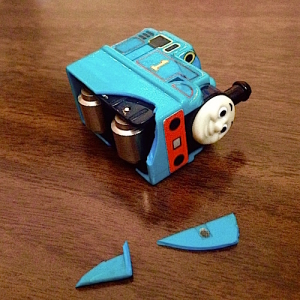When You’ve Broken What You Cannot Fix

My son loves cars, motorcycles, planes and trains. He likes to look at them and imitate the sounds they make, but more than anything he likes to play with them—the smaller versions for now. Many times he plays rough and “bonks” them together and the inevitable result is tragedy.
Something breaks. This time it was Thomas the Tank Engine.
“Mommy, can you fix it? Daddy, is it broken?”
In his reckless ignorance, my son made a mess, shattering one of his prized possessions. By the way he spoke you would have thought he was the victim of a vicious crime against his beloved train, but in reality he was the villain. He was the cause of his own sorrow.
Realizing you’re the problem
Jesus proclaims to an equally broken world, “Come to me all who labor and are heavy laden, and I will give you rest,” (Matt 11:28). What a wonderful invitation! But the temptation is to look at those in spiritual distress and excuse them as victims and to excuse ourselves as well. The temptation is to take the words of Jesus as proof that you are not the source of your own sorrow and sin.
Earlier in the chapter Jesus was proclaiming woes upon cities that refused to repent after Jesus came to them (Matt 11:20-24). The cities were not passively burdened down by circumstance and oppression, but were actively rebelling against and rejecting Jesus.
When Jesus speaks about giving rest to the heavy laden, he is speaking of a spiritual reality because he then says, “and you will find rest for your souls,” (11:29). He had been working miracles and teaching powerfully in Chorazin, Bethsaida and Capernaum and they refused his offer. The problem with people in these cities was their tormented souls. Just like them, your life, heart, and thoughts are riddled and wrecked by sin, failure, and rejection of God—making you the source of your distress.
Finding the rest your don’t deserve
However, you are not the solution. You are no more the answer to the problem than my son was to his broken train. He needed his mom or dad to get some super glue and make it right—something he was incapable of doing. I always tell him to come to me when he has a problem, or when something hurts, or when he needs anything at all. I say this knowing that his bad decisions or lack of experience will likely be the reason he needs help.
But does God act like that? Does Jesus really care for villains, or is he only available to victims?
“Go and learn what this means, ‘I desire mercy, and not sacrifice.’ For I came not to call the righteous, but sinners,” (Matt 9:13). When Jesus says come to me for rest, he speaks with full knowledge that you are the guilty party. He understands that you are one who has made a ruin of your life and does not question the fact that you are a sinner needing grace.
What have you done with his invitation? Have you been rejecting it, all the while thinking that other people in the world, or the system, or God himself is to blame for your problems? Embracing this victim mentality is a guaranteed way to reject the rest that Jesus offers. For, Jesus did not come for those who presume they are innocent before God, but for sinners who know they are guilty.
So come to Jesus Christ who knows where you have been and what you have done. He knows that your broken life is your fault, yet he still offers mercy and forgiveness when you repent.
Come to me, all who labor and are heavy laden, and I will give you rest. Take my yoke upon you, and learn from me, for I am gentle and lowly in heart, and you will find rest for your souls. For my yoke is easy, and my burden is light. Matthew 11:28-30

